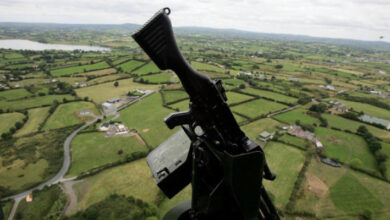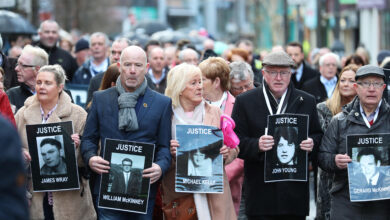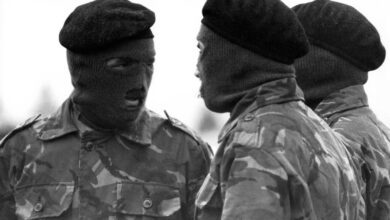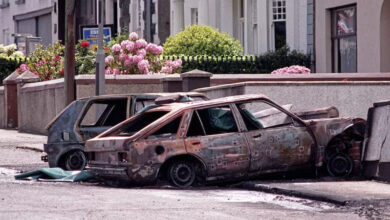Jackie McDonald, UDA: la classe operaia lealista “sta votando Sinn Fein”
Loyalist working class ‘voting SF’
by Sam McBride
SOME loyalists from Belfast’s Shankill Road are starting to vote for Sinn Fein, senior loyalists have said, because they claim that political unionism has abandoned its working class support.
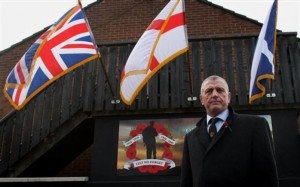
In the hour-long interview, Jackie McDonald, the man most believe is the UDA leader, repeatedly insists that its criminality has gone forever.
As part of that move from paramilitarism to politics, several UPRG candidates will stand in May’s council elections.
The reason that they are standing, former UDA prisoner Colin Halliday says, is that working class loyalists feel disconnected from mainstream unionist politics.
He says: “In certain areas like South Down, unionists voting for nationalist candidates is tactical. In West Belfast, it wasn’t. Now it wasn’t a big percentage and it wasn’t big numbers but there were votes from loyalist areas went into the box for Sinn Fein.
“What we’re taking from that is that (those voters believe) ‘These people are doing the work for us. We’re being neglected by our own politicians.'”
Halliday warns that if unionist politicians did not realise that “the days of putting a rosette on a donkey and parading it through unionist areas” are over, they would “end up like dinosaurs”.
What politicians should now be discussing, Halliday contends, is “housing, education, health, employment”.
McDonald adds: “It’s a terrible indictment on the DUP and the voters from West Belfast, on the loyalist side, that five MLAs are Sinn Fein and the other one’s SDLP. There’s not a unionist/loyalist representative.”
While sharply critical of the DUP and UUP, they have praise for certain politicians, singling out Lagan Valley MP Jeffrey Donaldson as “a hard worker”.
McDonald also has words of praise for David Trimble: “Through his courage, the UUP provided the platform. The DUP criticised it. And then they got on it and used that as their launch pad. So you have to give the UUP credit for what they did. You have to give the DUP credit for going from ‘never, never, never’ to where they are today.
“And we do give that credit to both parties but we’d like some credit back for the efforts we’ve made to give them the breathing space they’ve needed to make the changes they’ve made.
“We’re making the biggest change of all.”
One of the UPRG’s candidates, community worker Paul Clissold who is standing in Banbridge, says: “The alarm bells should be ringing for the UUP and the DUP. It’s an indictment of their inverted snobbery that in working class areas some, a minority, feel the need to vote for other candidates not necessarily from their political ideology. That should worry them.”
But unionist voters have a long history of shunning candidates they believed were too close to gunmen, leading to the demise of the UDP, PUP and a host of other loyalist political parties.
And the UDA has a bloody history of murders — mainly of innocent Catholics — and in recent years for continuing to extort money from businesses in loyalist areas and deal in drugs.
So why should this latest effort convince a sceptical electorate?
“We’re cleansing ourselves, if you like, as we come along,” says McDonald.
“I think there’s a recognition that, after decommissioning, people — ex-paramilitaries or ex-combatants or ex-prisoners — everybody’s prepared to move on and engage for the sake of the community. We want to provide a better way of life for working class people.”
That desire for a new start should be judged on its actions in refusing to retaliate to the growing number of dissident republican attacks and restraining inter-community violence, McDonald says: “What has to be appreciated is the effort by people like ourselves by not retaliating when the soldiers were murdered (in 2009), not retaliating when Constable Carroll got murdered and the hard work that’s being done on the interfaces.”
But, speaking of unionist politicians, he adds bitterly: “We’re the ones who were the shovels — we’re the ones that do all the digging; they’re the ones that sit in the buildings when they’re finished.
“But we need to be appreciated. It can’t be just the folks on the hill.
“All the interface violence, all the dissident threat which is being dealt with in the most peaceful manner ever imagined by loyalist paramilitaries… if that was to fall apart the peace process would fall apart.
“That’s the basis that the peace process works on and (therefore) they can do their bartering in Stormont. They need that and they have to appreciate that.”
McDonald’s dislike of Stormont’s aloofness from working class loyalist areas is, at least in part, fuelled by Margaret Ritchie’s ending of Stormont funding for the UDA-linked Conflict Transformation Initiative, an attempt to move paramilitaries into community work, in 2007.
“It’s gone from 14 jobs to seven jobs to no jobs. So if our constituency say to us: ‘What have you got out of the peace process and what have you got since you decommissioned?’. We’ll say: Well, we’ve got no jobs.
“When…people look at us and say, ‘why did you do it?’: Because it had to be done. We didn’t decommission for any other reason than it was the right thing to do. We used to say that the IRA could never decommission because how are they going to get their AK-47 off wee Paddy on the border who’s been shooting peelers and soldiers for 25 years?
“The answer is that wee Paddy still has his AK-47 on the border. They gave up the stock, whatever they did, and it was a substantial amount of weapons, so they’ve decommissioned to all intents and purposes.
“Wee Paddy on the border’s still got his AK-47, but he can say ‘Our Martin’s running the country’. In loyalism, what have we done? We’ve given up the weapons but what have we got? We lost 14 jobs.”
Halliday adds: “What we’re saying is that we’re an asset; we’re not a threat any more. We can’t be on probation forever.”
Many unionists, even those who tolerate or support republicans’ position in the Stormont executive, are sceptical about Sinn Fein because it has never come out and apologised for the IRA’s role in hundreds of murders.
Asked about loyalist apologies for their actions, McDonald points to Gusty Spence‘s 1994 statement on behalf of loyalist paramilitaries which spoke of “abject and true remorse” to all innocent victims of loyalist violence: “The UDA has been saying that for years, that we were a product of the Troubles, we did not cause the problems, but were part of them.”
Halliday adds: “In our two statements — one in 1994 and one in 2007 — it was reiterated that we made mistakes and (gave) our apologies to innocent victims.”
Whatever the language — and there will be many voters who view those words as inadequate, given the butchery of loyalist gangs during the Troubles — these men insist that the crucial point is that they have no intention whatsoever of returning to violence.
They sound weary of the Troubles and disillusioned with what it was all about. McDonald says that the UDA’s realisation it could not win evolved from the late 1970s: “They thought then that they could beat the IRA. But they realised they couldn’t beat them — they had to bring them on board.”
He argues that former paramilitaries can be used to convince today’s generation that violence is futile: “Some of the young ones would look at the likes of Colin and myself who have been through it all as the role models for what we used to do and they want to be what they think we used to be.
“But they don’t want to listen to us when we tell them…they don’t see us as role models as what we are — just as we were.
“We’re moving further and further away from our strong points — the numbers we had, the weapons we had — we’re moving further and further away from that to a place where we’re easily accessible, where we can become involved in the politics of the future.”
Halliday says of the UDA’s future: “It’s not if or when, it’s how they leave the stage. That has to be right. It was right for republicans.”


